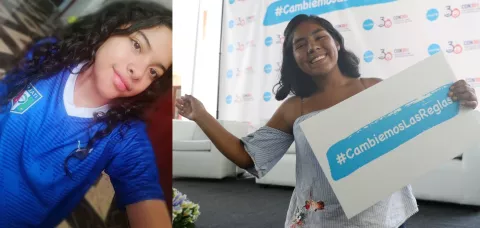Franyyerson Montero is 12 years old and has been walking for four months. Sometimes he says that he can no longer feel his feet, that he is looking ahead, as if to infinity, thinking that someday that road will end for him, that at some point that cement track, that trail, those sneakers about to break, that feeling of starting and never ending will end. And he will be somewhere, without fear and without haste, accompanied only by the certainty that he finally has a place to call home.
He had not yet left Venezuela when in his mind he began to walk. It happened one day when he came home from his school, “Monsignor Ramon Inocente Lizarde”. He was in the first year of high school and although there was no bread on his table, he had friends at the door of every house in his neighborhood. That day his mother greeted him with news that he had already seen coming: “We are leaving for Chile” - she told him and he, who knew that the house purses were more than empty, only managed to ask and how? His mother took him by the face, looked him straight in those huge brown eyes and answered: the only way we can do it, walking.
That same afternoon, his mother, his aunt and his cousin began the long journey that has not yet ended.
“We first walked to Colombia, slept in the parks and a bus gave us a ride to Medellín. From there we got off and continued. I was very scared because there are groups that don’t like migrants and beat them. Everyone was talking about it. There were several fellow countrymen that we found injured on the roads. My feet hurt, I felt like crying, I wanted to tell my mother to go back, but I knew it was impossible”.
The trail became harder with the grueling cold of Rumichaca, in Ecuador. “We didn't even get warm when we walked, and to get out of Ecuador we had to pass a frozen river. When I touched that water, I realized I hadn't taken a bath in weeks. I felt sorry because at home I bathed all the time, when I came back from school, after playing in the afternoons, at any time then. But this was my life now. Just move forward, walk, and move forward. Until we arrived in Peru through Aguas Verdes, and I found this, this place to rest for a while, the tables, the puzzles, the colored pencils”. For Franyyerson, the space UNICEF had set up was a wonderful reality that crept into his tired thoughts.
In addition to these places that are called “friendly spaces”, UNICEF has implemented water points in border areas so that hikers can hydrate themselves, fill their tumblers with water and take fresh water for the road. Something as valued as the water is the opportunity to play and be entertained that these spaces provide. Here boys and girls like him can sit, talk, dispel their thoughts and play. With monitors to greet them and listen to them, they have a moment to watch puppets, read, have fun with board games or simply rest on a mat and recharge their batteries.

“I had not had this in the whole trip. I talked to the lady who is there and then I painted. It relaxes me to draw, to read. My mother is receiving information to see how we continue our journey and I have asked her to stay here for a while to get some fresh air, lie down on the mat, to be calm. I know I have a long way to go to reach our final destination, but this place has been the most beautiful thing that has happened to me since I left Venezuela. Every time I see a polo shirt of that color,” he says, pointing to the UNICEF polo shirt, “I will know that I had a moment to rest, to paint, and I will remember you. I will not forget you.
Before continuing, Franyyerson asks if he will find another place like this on his way. We can rest assured that he will. In addition to the place where we are, which is in Aguas Verdes, UNICEF has set up another rest and play area for children in Pueblo Nuevo, 25 kilometers further south, and a service for the family in Mancora, in the Piura region.
And so, while Franyyerson continues his journey, UNICEF continues to work on the northern border of Peru for the rights of migrant children. In the last three months, the friendly spaces supported by UNICEF -located in Aguas Verdes and Pueblo Nuevo communities- have received more than 2,000 migrant children on their journey.
Aguas Verdes (Tumbes), on the northern border of Peru and Ecuador.


